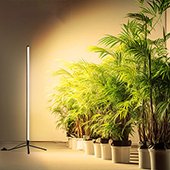Menu
Do You Need A Ballast for LED Grow Lights?
Are you contemplating how to create a year-round green oasis in your home? With technological advancements, LED grow lights have become the top choice for many indoor gardening enthusiasts.
But when upgrading your lighting system, a common question pops up: should you also equip LED grow lights with ballasts? This query might sound technical, but in reality, a ballast for an LED grow light is much like a winter jacket in summer—unnecessary and out of place.
LED plant lights do not require ballasts. We can categorically clarify this point. LED lights operate on direct current, typically with constant drivers to ensure stable electricity flow, not ballasts.
Why do some plant lights necessitate ballasts? Today, we’re diving into this straightforward yet crucial question to set the record straight.
The Role of Ballasts in Traditional Lighting
In the realm of fluorescent lighting, a ballast is indispensable.
Not only does it ensure the smooth startup of the lamp, but it also maintains stability and efficiency throughout the entire illumination process. Without its vigilant regulation, fluorescent lamps could have a shortened lifespan, flickering light, or even fail to function altogether.
A Starter Booster: When a fluorescent lamp needs to be turned on, the ballast provides a “high-voltage wake-up call,” generating a momentary surge of voltage to ionize the gas within the tube, thus igniting the first spark of light.
Current Regulator: Once the lamp is lit, the ballast adjusts and stabilizes the current passing through the tube, ensuring it doesn’t damage the lamp due to excessive current or dim due to insufficient current.
Energy-saving Assistant: By restricting unnecessary current flow, the ballast also aids in energy conservation, guaranteeing the luminaire operates at optimal efficiency.

LED Grow Lights Do Not Need Ballasts
Shifting our focus to modern LED plant lamps, the role of ballasts becomes obsolete as LEDs employ their unique operating mechanisms and management systems.
Unlike old-fashioned bulbs that rely on heating a filament to emit light, LEDs convert electrical energy directly into light energy through the movement of electrons in semiconductor materials, boasting high efficiency – akin to a “magician” that transforms electricity directly into light.
Furthermore, they favor direct current (DC), which makes LEDs inherently compatible with batteries and most contemporary power systems, minimizing conversion losses from alternating current (AC), thereby conserving energy and enhancing efficiency.
Inside every LED plant growth lamp resides a diligent constant current driver, working silently in the background. Its mission is to precisely regulate the current flowing to the LEDs, maintaining a steady, unchanging flow regardless of fluctuations in the input voltage, acting as a customized nutritional plan tailored specifically for the LEDs.

The advantage of this approach is that it not only ensures the long-term stable operation of LED lights, thereby prolonging their lifespan but also provides plants with a consistently high-quality light source, fostering healthy growth.
It’s like when you’re baking a delicious cake and need to add sugar and flour in precise proportions. The constant current driver acts like an accurate electronic scale, making sure each ingredient is added with perfect precision, resulting in a flawlessly baked cake every time.
Similarly, with the benefit of a constant current driver, every “light emission” from an LED plant growth lamp delivers just the right amount of “photosynthesis fuel” to the plants, allowing them to enjoy a tailor-made “photosynthesis feast” at all times.
Dear gardening friends, the next time you’re selecting accessories for your LED plant lights, remember, that ballasts are not on the shopping list!
Don’t let misinformation or unnecessary information lead you to spend money on something you don’t need. Save those funds to invest in higher quality LED lights or more plant seeds, making your home garden even more lush and vibrant.
In short, the supposed connection between LED grow lights and ballasts is a beautiful misunderstanding. Clarifying their relationship allows you to proceed with greater wisdom on your indoor gardening journey.
Get in touch with us!
From custom light planning, to tailored quotes, and everything in between, our team of horticulture experts are always ready to assist.




